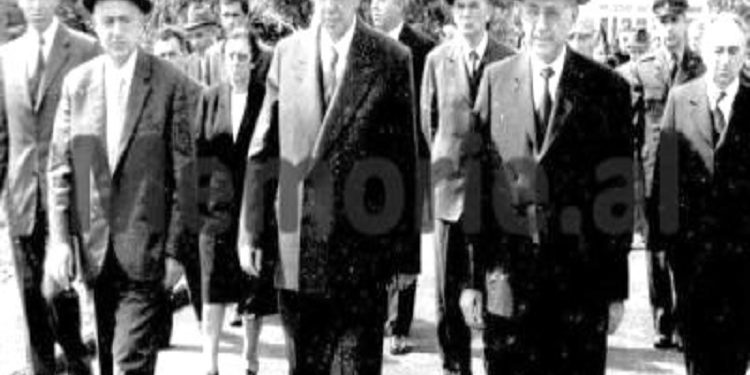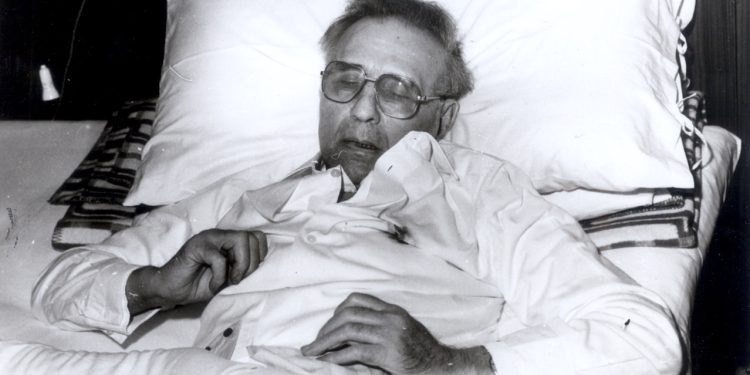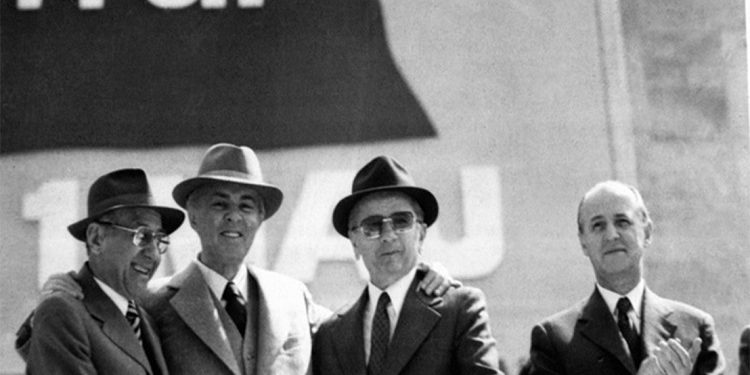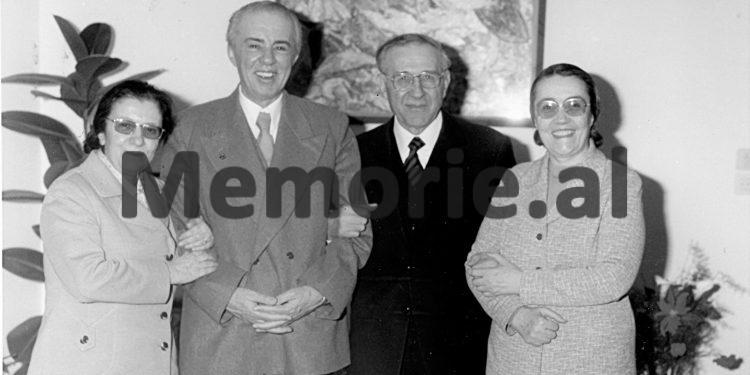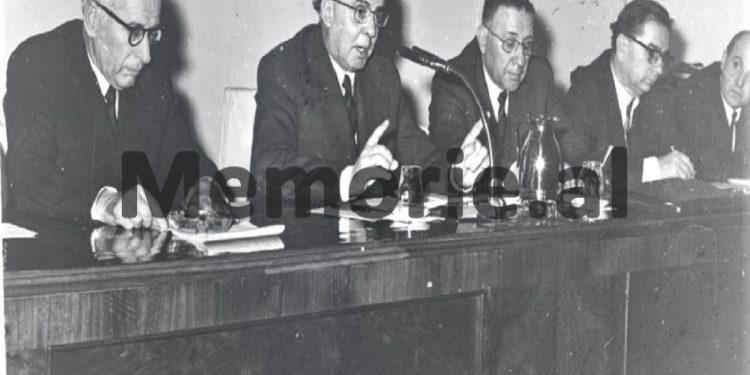Part One
Memorie.al / “If Mehmet had been like this from 1942-43, when he was in a concentration camp, until 1981, when he committed suicide, they say 40 years. What did he wait for? He was at the head of the country. If he had been an agent of the Americans or the English, what did they want more to ruin Albania?! Mehmet would have acted”! In a long story given years ago to the magazine “ABC”, former president Ramiz Alia, has told his life and confidential reports in the dome of the communist state. He has spoken for the first time about the clashes in the Central Committee and what happened a few minutes after the death of the former iron prime minister, Mehmet Shehu!.
There, Alia also recounts his relations with former Prime Minister Shehu, which he describes as correct, but not cold. However, it is stated that Mehmet wanted to implicate him in the Todi Lubonja case. But the surprising statement in this interview is that Mehmet Shehu was not an agent.
According to Alia, if he were an agent, from the time he was in the concentration camp until 1981, when he committed suicide, he would have been able to act within such a long time, 40 years, especially since for the Americans and the English, an agent like Mehmet Shehu would have been enough to overthrow the communist regime in Albania.
Mr. Alia, what were the stages of your intellectual formation, starting from the high school period, a time for which you have good memories. Who were the spiritual, philosophical and literary idols of that time, the relationships with your high school friends? Are there any characters among them who became well-known figures and especially the relationships with Todi Lubonja, who remains one of your friends today?
R. Alia: I was born in Shkodra, where I attended two grades of primary school. Later, the family moved to Tirana, where I continued my schooling. After finishing primary school at the “Red School”, I enrolled in the Tirana gymnasium. At that time, the capital’s gymnasium was one of the best schools in the country, and don’t forget that there were only the Shkodra gymnasium, the Korça Lyceum, the ‘Normalja’ of Elbasan, and the Tirana gymnasium. These were the complete secondary schools, except for the ‘Technical’ in Tirana.
I want to say that the Tirana gymnasium was an institution where very knowledgeable teachers and pedagogues taught. I had very good teachers, such as Vangjel Gjikondi, Minella Karajani, Sotir Angjeli, Vasil Andoni, Mihal Zallari, Vedat Kokona, Nonda Bulka, etc. The school principal was Safet Butka. When the University of Tirana was established, most of them became teachers, founders of that university.
Life in the gymnasium was special: at that time we read a lot, as young people we were, and in that environment we were formed in all senses. In 1939, during the occupation, I attended the gymnasium and it was precisely this moment that marked the formation of anti-fascist sentiment for the young people of the schools. After 1941, the year of the establishment of the Communist Party, when the anti-fascist movement included all the school youth, I joined the Communist Youth Organization.
I said this, because this also marks involvement in political life. This time also determines the close friends with whom we discussed various issues in different fields. I had many friends, some of whom were killed, like my close friend Manush Alimani, Siri Kodra, Zeqi Agolli, etc. We discussed politics, but also culture in general. They read literature, mainly Italian, but also American such as Steinbeck, Mark Twain, Dante, etc.
Was there any affection of Albanian youth for Dante, for other popular poets, for Italy? Are we referring to a period of Italian cultural penetration….?
R. Alia: Of course, there was. But many others were also read. At that time, we also read philosophers such as Schopenhauer, Nietzsche, etc., because it was a great curiosity. We did not know Marx well. We only knew a few of his basic theses. You mentioned Todi Lubonjë. He is a character that I have been connected to all my life, from my youth to the present day.
Todi was higher in school than I was. We were childhood friends and our houses were close in Tirana. Even after the liberation, we worked in sectors that connected us, such as the youth sector, culture, etc. It is not necessary to go into Todi’s history.
Did you feel sorry for Todi’s fate and what did you do to change that fate?
R. Alia: What happened to Todi, I have always said, starting from the Party line at that time, was considered wrong. I myself was of the opinion that there (at the 11th Festival) there were exaggerations, always according to the political line of the time. For this, I personally criticized Todi, since the evening of the festival. But, as the events unfolded, especially Todi’s imprisonment, I suffered personally, as for a close friend of mine. But, it is understandable, at that time, more than expressing my pain, I could not do anything.
But, when you became First Secretary and President of Albania, you had all the possibilities but…?!
R. Alia: Yes. They may say why I did not do anything for Todi! But Todi was not the only problem. The problem was that at that time, the issue of dozens and dozens of party cadres who had been convicted had to be reviewed. So, to undertake such a review would have been extremely difficult for me. It would have been considered a departure from Enver Hoxha’s path, a departure from all the party’s activities up to that time, a review, a complete revision of the party’s line, which was not possible.
The issue of Mehmet Shehu continues to occupy the pages of the press today. Do you have any current reflections prompted by this press? What can you say about him as a political and intellectual figure? What was your relationship with him?
R. Alia: Regarding Mehmet Shehu, the fundamental issue that various authors write about today is: Did he kill himself or was he killed? I will say categorically that Mehmet Shehu killed himself and the proof for this is not where the coffin was found or not, but the letter written by him. In that letter, written by his hand, it says that he is killing himself, gives recommendations, etc., etc.
In those recommendations, he also mentions you….?!
R. Alia: In that letter he also mentions me, in the sense that he tells Enver Hoxha; “beware of the people around you”, he mentions Kadri Hazbiu, who calls him “Jago”, he mentions my name and that of Foto Çami. But mainly, my name, which he calls me “Khrushchev”, etc. These were thoughts that Mehmet had.
Why did Mehmet have this thought about you?
R. Alia: Before I say why he had this thought, I wanted to show my relations with Mehmet Shehu, or rather, my opinion about Mehmet. He was a talented cadre and leader of our country. He was knowledgeable, a well-read man, politically astute, very hardworking and active. There was no area of Albania that Mehmeti had not trodden underfoot, as they say. From this point of view, he was without a doubt one of the leading cadres of the party.
Were there any differences with you that led him to reach such conclusions?
R. Alia: No differences. He did not agree, or he saw my position, which was relatively mild, as a sectarian one. I was not cruel to the people I worked with, to the sectors I controlled, etc. For example, what happened with the group that included Todi Lubonja, which was the sector I headed? Mehmeti stood up at the Plenum of the Central Committee and said that Ramiz was responsible, meaning that he wanted, in one way or another, to implicate me in that problem.
So, then, were your relations cold?
R. Alia: They were never cold, but I would say fair. My relations with Hysni Kapo were much closer than with Mehmet.
Did Mehmet’s position in his last letter before his death have as a starting point your critical position towards him in the Bureau meeting?
R. Alia: No, I don’t believe so. My position was measured. I did not criticize Mehmet with empty words. But Mehmet must have formed that opinion about me before, seeing my tolerance in leading the sectors for which I was responsible. I was more understanding with people. I was not cruel in leading these sectors, where he thought that foreign influences were appearing, were visible.
Was it possible that he was part of the struggle for power? Did he perhaps consider you as the main rival to be Enver Hoxha’s successor?
R. Alia: I don’t believe it was based on this concept because, for the party leaders, Mehmet was considered the man who would come after Enver Hoxha. While Hysni Kapo was alive, there was some doubt about who would be Enver’s successor, but absolutely for me, who was in the third or fourth line. After Hysni died, it was Mehmet who was considered the successor. Even we, the secretaries of the Central Committee, when Enver was not there, would go to Mehmet to seek advice. Therefore, this was not the motive.
At the moment when Mehmet’s friction with Enver began, regarding the issue of his son’s engagement, could he have thought of some conspiracy involving you…?
R. Alia: He may have thought many things, but I am not able to speak about what he thought.
After his death, a cold stance was taken, with an official statement. Then, a criminalizing campaign was launched against him as a police agent, etc. Do you stand by the accusations today, after 25 years, that he was an agent of the Yugoslavs, Americans, Russians, etc.?
R. Alia: Mehmet’s suicide complicated the problem, as the question arose as to why he did this?! Why did he kill himself?! That was precisely why. When I was informed of Mehmet’s murder, I went to Enver to inform him. The first thing Enver said: “Why did he kill himself?” He asked himself a question. He didn’t want an answer from me. So, this question arose. And later, after a day or two, in Enver’s office, he asked me a question: “Have you seen those documents that came to us in 1964, about Mehmet”? I hadn’t seen anything and I said: “No, I don’t know anything”.
He got up; they were in the safe of Hysni Kapo who had died at that time. Enver kept Hysni’s safe in his safe. He opened that safe and gave me an envelope with cards, which were foreign intelligence cards. Authentic or not, I can’t say anything.
The fact is that Enver and Hysni had seen them in 1964, only these two, had come to the conclusion that this was a provocation that the Russians were making us, to separate us from Mehmet. And, for this reason they had closed it for about 17 years (1964-1981). Since Mehmet killed himself, Enver began to believe that these were true. I can’t say anything about these documents.
To be honest, when I read them, it seemed like you were dealing with an agent of their Intelligence Service. Whether they were true or not, I can’t say anything. In 1987, at our embassy in Argentina, an American handed over a letter that said: “Those documents that were given to you in 1964 are true.” So, when both Mehmet and Enver were dead. I saw that document, I read it to the Central Committee of the Party and I told them: “I don’t want any comments, but it should be put in the archive.” It should be in the archive.
Does it seem a bit funny to you…?
R. Alia: It could be funny, it could be nothing. Today I can’t comment at all, because I don’t have any information. I’m talking about what was real.
What about my heart?
R. Alia: I say this with all my heart: If Mehmet had been like this from 1942-43, when he was in the concentration camp, until 1981 when he committed suicide, they say 40 years. What did he wait for? He was at the head of the country. If he had been an agent of the Americans or the English, what did they want more to set Albania on the right path?! Mehmet would have acted. But until then he has not acted.
That is, when I say acted, an agent of that level commits a coup. He does not say: …This is so, and this is so… It is idle talk. So, he did not commit such an act. There have been numerous cases, such as, for example, during the break with the Soviets. From this point of view, the conclusions on that issue are questionable.
Mr. Alia, in 1981, the Yugoslav press called what happened to Mehmet “murder” and said that; “with the assassination of Mehmet Shehu, Albanian irredentism suffered a severe blow”. Meanwhile, from some analyses that were conducted in America about Albanian-Yugoslav relations, Mehmet Shehu was considered a representative of the hard-line wing regarding Kosovo. This is how the articles initiated in the newspaper “Bashkimi”, an organ that was closer to the government, therefore closer to Mehmet Shehu… were also viewed?
R. Alia: These are conclusions that the Americans may have drawn, of which I am not aware. Regarding the Kosovo problem, the Serbs’ most adversaries for Kosovo was Enver Hoxha. It is quite evident in his writings, but this does not mean that Mehmet was not like that. But I believe that the expression uttered by the Yugoslavs about “…the end of irredentism…” has to do with the fact that, considering Mehmet’s wild and strong character, they could think that this man could have an adventure in Kosovo, that is, enter Kosovo militarily.
Was there any military plan for this?
R. Alia: There may have been such plans in Shtatmadhori, but I am not aware of those plans. From this I say that it may be more of an assumption than a confirmation. This does not prove anything. However, attacking Yugoslavia would be an adventure, especially considering the weight it had in Western circles.
There is a logic that interprets the fate of the Shehu family as an inspiration for the respective families, namely the family of Enver Hoxha. If you look, there are many similarities in the upbringing of the children, similar schools, similar workplaces, but cultural differences. What do you think; did the families influence Enver Hoxha’s ferocity towards Mehmet Shehu?
R. Alia: On this issue, of family relations, I am not inclined to see it that way, because I do not believe that there was a competition between the two main leaders of the country, as to whether your child or mine is more advanced, more developed, etc. It seems to me that it shouldn’t be seen like that. You are dealing with two main personalities, who have other problems, bigger than that of the children. What happened to Mehmet with his son was a tragedy for him, which led him to commit suicide….! But no more.
Did he have a preference for any actor, writer, scientist…?
R. Alia: Mehmet read a lot. He was not indifferent to any field of social activity. He mainly loved literature and relationships with people of literature, he had good ones. He also loved Kadare. At first, not so much, to be honest. For what reason? Because Mehmet was by nature a sectarian and saw the negative sides of others.
He was nervous and often had the last word before the first. But later, when Kadare became friends with Mehmet’s children, he consequently got to know him better. Mehmet began to respect and appreciate Ismail Kadare. This was also influenced by the fact that Enver Hoxha generally had a positive attitude towards Kadare, and Mehmeti did not allow himself to hold an attitude opposite to that of Enver.
Any episodes of yours with Mehmeti…?
R. Alia: My relations with Mehmeti have generally been good. I have never had a quarrel with him. Of course, I did not agree with his nervousness, especially towards people from art, culture or the press, which were sectors that I led. But I want to say one more thing. Mehmeti was very correct.
I do not remember that there was any decision in the Council of Ministers, for the sector that I led from the party side, such as problems of education, culture, etc., that was taken without first asking my opinion. He would ask me, even formally, if I agreed on various issues. That is, from this point of view, Mehmeti was correct. / Memorie.al
Continues next issue




